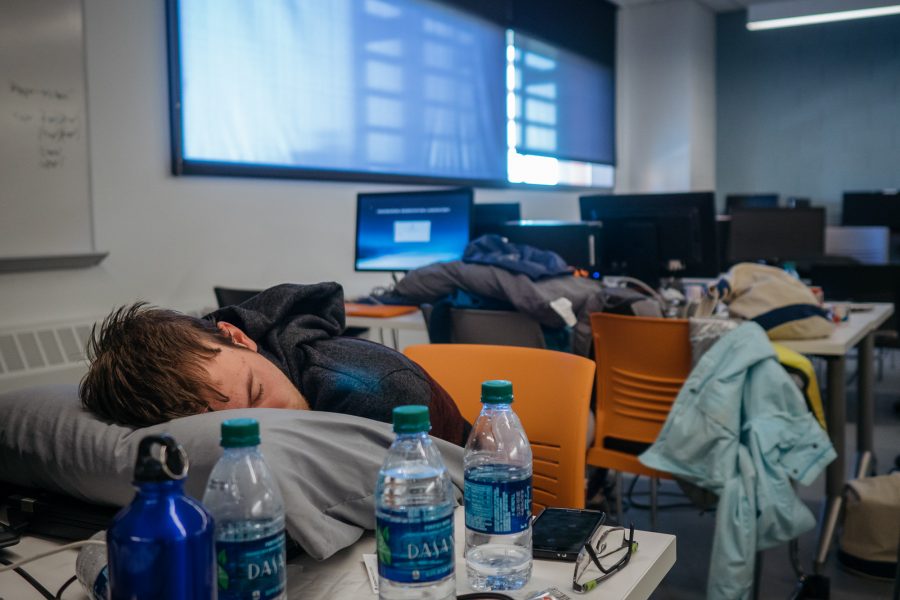Students’ lack of sleep leads to test anxiety
A student sleeps in the undergraduate students lounge of the Electrical and Computer Engineering building after two days on Sunday, Feb 21 2016.
Oct 25, 2016
The University is ten weeks into the fall semester and midterms are in full-swing. Students are spending most of their free time at the library, going to office hours and catching up on schoolwork. With all of this time spent trying to keep GPAs high, there doesn’t seem to be much room for maintaining an adequate sleep schedule.
Lack of sleep among college students has been correlated with negative effects on their health and academic performance. Disability Resources and Educational Services, the Women’s Resources Center and the Counseling Center are resources available on campus that students may use when in need of help; it’s just a matter of knowing when assistance is needed and seeking them out.
“Last year, a study done at Oxford University showed that people who’ve been awake for more than 17 hours straight have concentration and alertness levels that are equivalent to someone who’s legally intoxicated. If students deprive themselves of sleep, they’re stacking the deck against themselves and making it harder to learn what they need to know to be successful on an exam,” said Nichole Evans, assistant director of outreach and prevention, and media communications coordinator at the Counseling Center.
Evans said her experiences with students suffering from test anxiety have shown her how lack of sleep often makes anxiety worse.
“While being a student often means being busy and skipping sleep in favor of getting other things done, it’s important to make sure you’re consistently doing your best to get as much sleep as you need to feel good. This might mean learning more effective time management skills or evaluating your schedule and cutting things out if you’re overcommitted,” Evans said.
Get The Daily Illini in your inbox!
“I think it makes it harder to focus during the day, whether you’re in class or if you’re doing homework. It makes you less active, so you’re less sociable with your friends and you just can’t wait to get back to sleep,” Aswini Velivela said.
Velivela, sophomore in Business, said he was currently running on three hours of sleep and on average he only sleeps about five hours per night.
Some students believe staying up late the night before an exam is beneficial because it means the information will be fresher in their minds. Velivela disagrees.
“If I was going to take a test the next day and I was really nervous about learning all the material, I wouldn’t stay up late. I would just sleep early and get up early the next morning and study in the morning before the test. I think that might be better,” Velivela said.
Jonilynn Dietz, freshman in ACES, said she experiences less test anxiety than she did in high school, but she still sits up at night or all day thinking about a test or project that she has due.
Regardless, Dietz said she tries to have between six and eight hours of sleep every night because it helps her focus more on her homework or in class.
“When I have eight hours of sleep, I have a lot more motivation, like ‘OK, I can do this. I can get this done now.’ It’s a lot easier,” Dietz said.
Dietz also said that while sleep is very important, she would stay up studying if she has to.
“If you fall behind in your work and you really need it done before the due date, you’re obviously going to stay up to do it because your grades are super important,” she said.






